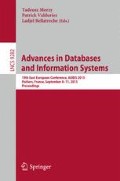Abstract
Medical devices like Medical Linear Accelerators (LINAC) are extensively tested before they are used in routine practice. Such systems typically interact with multiple other systems that produce complex input data, like medical images annotated with extensive metadata. Before such a system is actually used in a hospital with real patients it has to be tested with test data as realistic as possible. Suitable test data, however, cannot be easily generated. For this reason vendors typically accumulate large collections of patient files over the years to have them available for various test scenarios. In the TDQMed project we have developed methods and tools that enable a tester to estimate both the quality of a test data collection and its applicability for a particular test goal. A prototype system has been implemented to demonstrate the feasibility of measuring specific test data related quality criteria like coverage of test space and closeness to reality. An evaluation with professional testers indicates that the overall approach is promising.
Access this chapter
Tax calculation will be finalised at checkout
Purchases are for personal use only
References
Batini, C., Cappiello, C., Francalanci, C., Maurino, A.: Methodologies for data quality assessment and improvement. ACM Comput. Surv. 41(3), 1–52 (2009)
Bendix, F., Kosara, R., Hauser, H.: Parallel sets: visual analysis of categorical data. In: IEEE Symposium on Information Visualization, INFOVIS 2005, pp. 133–140, No. 1. IEEE (2005)
Carreira-Perpiñán, M.: A review of dimension reduction techniques. Technical report, University of Sheffield, Sheffield (1997)
Chaudhuri, S., Dayal, U.: An overview of data warehousing and OLAP technology. ACM SIGMOD Rec. 26(1), 65–74 (1997)
Deza, E., Deza, M.M.: Encyclopedia of Distances. Springer, Heidelberg (2009)
Di Nardo, D., Alshahwan, N., Briand, L., Labiche, Y.: Coverage-based test case prioritisation: an industrial case study. In: 2013 IEEE Sixth International Conference on Software Testing, Verification and Validation, March 2013
Juran, J.M.: Juran on Planning for Quality. Free Press, New York (1988)
Law, M.Y., Liu, B.: Informatics in radiology: DICOM-RT and its utilization in radiation therapy. Radiographics Rev. Publ. Radiol. Soc. North Am. Inc. 29(3), 655–667 (2011)
Mildenberger, P., Eichelberg, M., Martin, E.: Introduction to the DICOM standard. Eur. Radiol. 12(4), 920–927 (2002)
Mustra, M., Delac, K., Grgic, M.: Overview of the DICOM standard. In: 50th International Symposium, ELMAR, pp. 10–12. IEEE, Zadar, September 2008
Ostrand, T.J., Balcer, M.J.: The category-partition method for specifying and generating functional tests. Commun. ACM 31(6), 676–686 (1988)
Pipino, L.L., Lee, Y.W., Wang, R.Y.: Data quality assessment. Commun. ACM 45(4), 211–218 (2002)
Redman, T.C.: Data Quality: The Field Guide, data manag edn. Digital Press, Newton (2001)
Sommerville, I.: Software Engineering. International Computer Science Series, 8th edn. Addison-Wesley, Reading (2007)
Stahl, H.: Clusteranalyse großer Objektmengen mit problemorientierten Distanzmaßen. Verlag Harri Deutsch, Thun, Frankfurt am Main, reihe wirtschaftswissenschaften edn. (1985)
Thomas, S.W., Hemmati, H., Hassan, A.E., Blostein, D.: Static test case prioritization using topic models. Empirical Softw. Eng. 19(1), 182–212 (2014)
Wand, Y., Wang, R.Y.: Anchoring data quality dimensions in ontological foundations. Commun. ACM 39(11), 86–95 (1996)
Wang, R.Y., Strong, D.M.: Beyond accuracy: what data quality means to data consumers. J. Manage. Inf. Syst. 12(4), 5–34 (1996)
Wang, R.Y., Ziad, M., Lee, Y.W.: Data Quality. Springer - Kluwer Academic, Boston (2002)
Acknowledgements
This project is supported by the German Federal Ministry of Education and Research (BMBF), project grant No. 01EX1013G.
Author information
Authors and Affiliations
Corresponding author
Editor information
Editors and Affiliations
Rights and permissions
Copyright information
© 2015 Springer International Publishing Switzerland
About this paper
Cite this paper
Held, J., Lenz, R. (2015). TDQMed: Managing Collections of Complex Test Data. In: Tadeusz, M., Valduriez, P., Bellatreche, L. (eds) Advances in Databases and Information Systems. ADBIS 2015. Lecture Notes in Computer Science(), vol 9282. Springer, Cham. https://doi.org/10.1007/978-3-319-23135-8_23
Download citation
DOI: https://doi.org/10.1007/978-3-319-23135-8_23
Published:
Publisher Name: Springer, Cham
Print ISBN: 978-3-319-23134-1
Online ISBN: 978-3-319-23135-8
eBook Packages: Computer ScienceComputer Science (R0)

